Das Hinzufügen eines Facebook Like Buttons zu Ihrer WordPress Website ist eine großartige Möglichkeit, das Engagement zu steigern und Ihre Follower in den sozialen Medien zu vergrößern. Er ermutigt die Besucher, mit Ihren Inhalten zu interagieren und sie mit ihren Netzwerken zu teilen. Unserer Erfahrung nach können Sie auf diese Weise ein größeres Publikum erreichen.
Die Einrichtung kann sich jedoch schwierig gestalten, wenn Sie mit der Programmierung nicht vertraut sind. Selbst wenn Sie es versuchen, besteht die Möglichkeit, dass Sie Kompatibilitätsprobleme mit Ihrem Theme oder Ihren Plugins bekommen.
Um die Arbeit zu erleichtern, empfehlen wir die Verwendung eines Plugins. Nachdem wir mehrere Optionen getestet hatten, erwiesen sich Like & Share und WPCode von BestWebSoft als hervorragende Wahl. Beide vereinfachen den Prozess und helfen Ihnen, Kopfschmerzen bei der Programmierung oder mögliche Kompatibilitätsprobleme zu vermeiden.
Wir vertrauen WPCode auch auf unseren eigenen Websites, weil es ein zuverlässiges, einfach zu bedienendes Plugin zum Hinzufügen individueller Funktionen ist.
In diesem Artikel zeigen wir Ihnen Schritt für Schritt, wie Sie einen Facebook Like Button zu WordPress hinzufügen können.
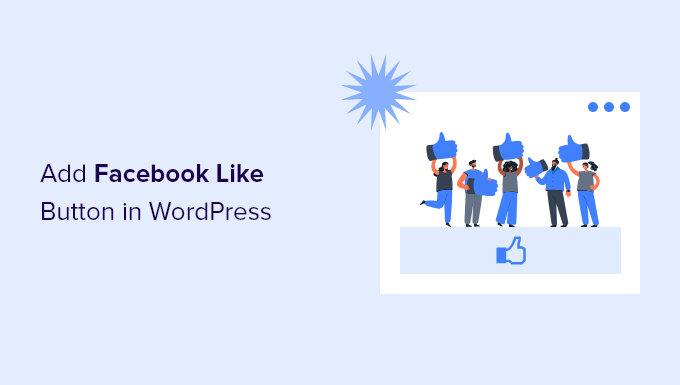
Warum einen Facebook Like Button in WordPress hinzufügen?
Facebook ist eine der beliebtesten Social-Media-Plattformen der Welt. Viele Unternehmen nutzen Facebook, um mit ihren Kunden in Kontakt zu treten und ihre Produkte zu bewerben.
Das Hinzufügen eines Facebook Like Buttons zu Ihrer WordPress-Website kann dazu beitragen, das Engagement zu erhöhen. Außerdem ermutigt er Menschen, Ihre Inhalte auf ihren Facebook-Profilen zu teilen und neue Benutzer auf Ihre Website zu locken.
Sie können den Facebook Like Button nutzen, um Ihre Follower zu erhöhen und eine Community aufzubauen. Er trägt dazu bei, das Bewusstsein für Ihre Produkte und Dienste zu schärfen und die Konversionsrate zu erhöhen.
Deshalb zeigen wir Ihnen, wie Sie einen Facebook Like Button in Ihre WordPress-Website einfügen können. Hier ist ein kurzer Überblick über die Methoden, die wir in diesem Leitfaden behandeln werden:
Sind Sie bereit? Sehen wir uns an, wie man einen Facebook Like Button in WordPress mithilfe eines Plugins oder individuellen Codes hinzufügt.
Methode 1: Hinzufügen eines Facebook Like Buttons in WordPress mit einem Plugin
Bei dieser Methode werden wir ein WordPress Plugin verwenden, um einen Facebook Like Button hinzuzufügen. Diese Methode ist sehr einfach und wird für Anfänger empfohlen.
Als Erstes müssen Sie das Like & Share-Plugin von BestWebSoft installieren und aktivieren. Weitere Details finden Sie in unserer Schritt-für-Schritt-Anleitung für die Installation eines WordPress-Plugins.
Nach der Aktivierung können Sie in Ihrem WordPress Adminpanel auf Like & Share ” Einstellungen gehen.
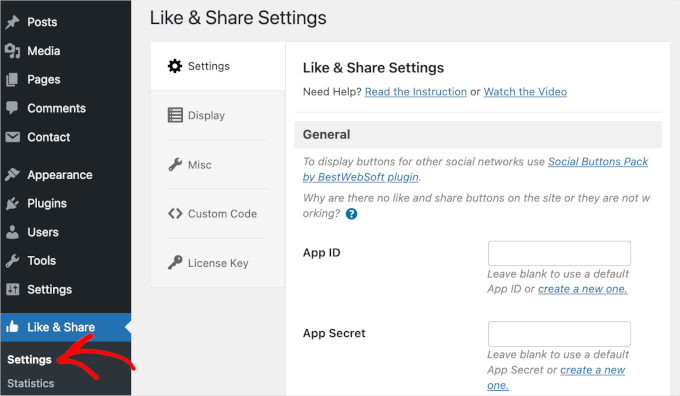
Als Nächstes müssen Sie eine Facebook “App ID” und “App Secret” hinzufügen. Wenn Sie diese Informationen nicht haben, folgen Sie einfach den nachstehenden Schritten.
So erstellen Sie eine Facebook App ID und ein App Secret
Klicken Sie im Bereich “Einstellungen” unter dem Feld “App ID” oder “App Secret” im Plugin “Like & Share” auf den Link “Create a new one”.
Dadurch werden Sie zur Website Meta für Entwickler weitergeleitet. Wir empfehlen, die Website in einem neuen Tab oder Fenster zu öffnen, da Sie die Seite mit den Like & Share-Einstellungen in Ihrem WordPress-Dashboard öffnen müssen, um die App-ID und das Geheimnis einzugeben.
Von hier aus müssen Sie einen App-Typ auswählen. Wählen Sie “Business” als App-Typ und klicken Sie auf die Schaltfläche “Weiter”.
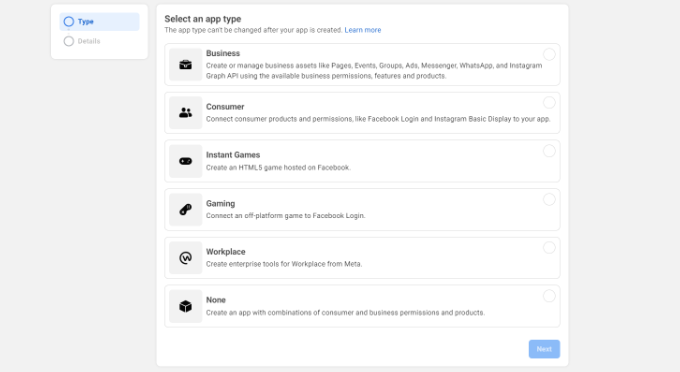
Als Nächstes müssen Sie grundlegende Informationen über Ihre Anwendung angeben.
Sie können einen Anzeigenamen für Ihre App eingeben und sicherstellen, dass die richtige E-Mail-Adresse unter dem Feld “App-Kontakt-E-Mail” erscheint. Facebook wählt automatisch die E-Mail-Adresse des Kontos, bei dem Sie gerade angemeldet sind.
Es gibt auch eine Option zur Auswahl eines Geschäftskontos. Sie können dies auf “Kein Business Manager Konto ausgewählt” belassen und auf den Button “App erstellen” klicken.
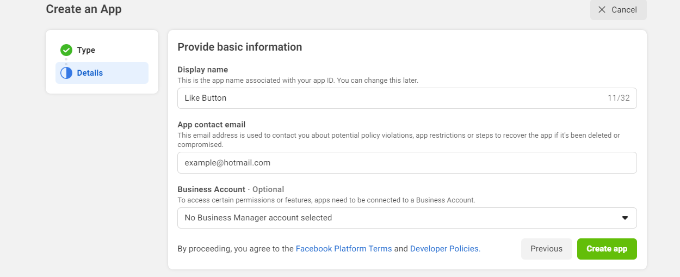
Dann erscheint ein Pop-up-Fenster. Hier werden Sie von Facebook aufgefordert, Ihr Passwort erneut einzugeben.
Dies ist eine Sicherheitsmaßnahme, um bösartige Aktivitäten auf Ihrem Konto zu verhindern. Geben Sie Ihr Passwort für Ihr Facebook Konto ein und klicken Sie auf den Button “Absenden”.
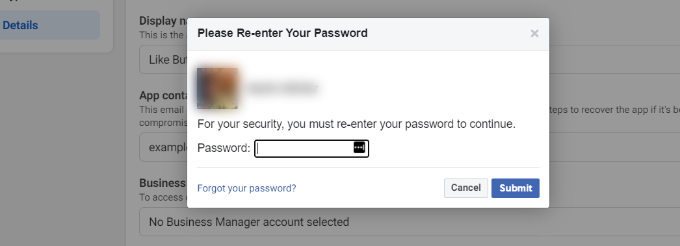
Danach sehen Sie Ihr App Dashboard.
Von hier aus können Sie über das Menü auf der linken Seite zu Einstellungen ” Basis gehen.
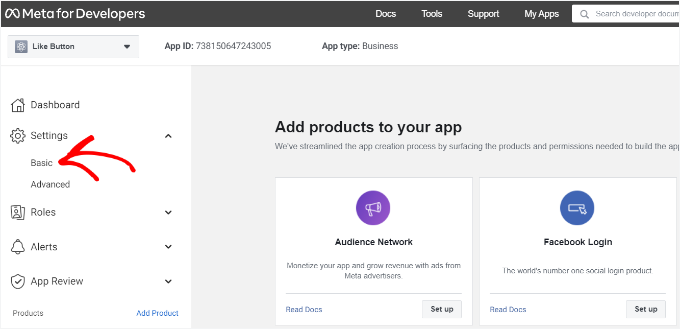
Erweitern Sie nun das Dropdown-Menü “Einstellungen” und klicken Sie auf “Basis”. Hier sehen Sie die “App ID” und “App Secret”.
Sie können diese Informationen jetzt in den Einstellungen des Plugins Like & Share eingeben.
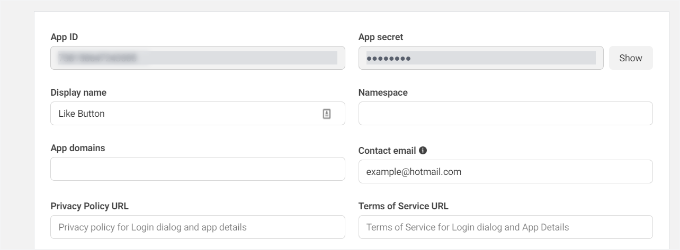
Beenden Sie die Anpassung Ihres Facebook-Like-Buttons
Kopieren Sie zunächst die “App-ID” und kehren Sie zu dem Tab oder Fenster zurück, in dem Sie die Seite “Like & Share ” Settings ” geöffnet haben. Geben Sie dann einfach die “App-ID” in das entsprechende Feld ein.
Wiederholen Sie nun den Schritt, indem Sie die “App Secret”-Daten von der Seite Meta for Developers kopieren und in die Einstellungen des Plugins Like & Share einfügen.
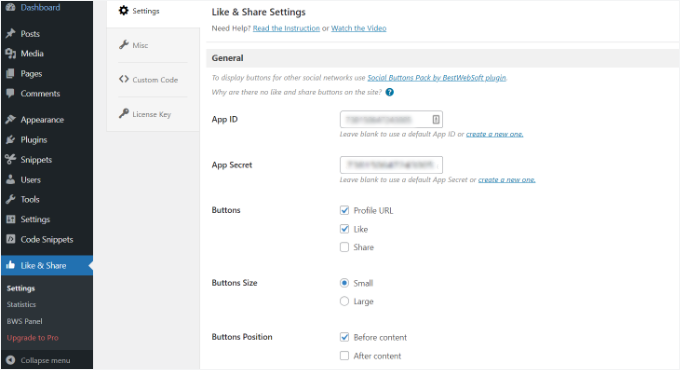
Danach können Sie wählen, ob Sie den Facebook Like Button zusammen mit der Profil URL und den Share Buttons anzeigen möchten.
Es gibt auch Einstellungen, um die Größe des Facebook-Like-Buttons, seine Position vor oder nach dem Inhalt und die Ausrichtung zu bearbeiten.
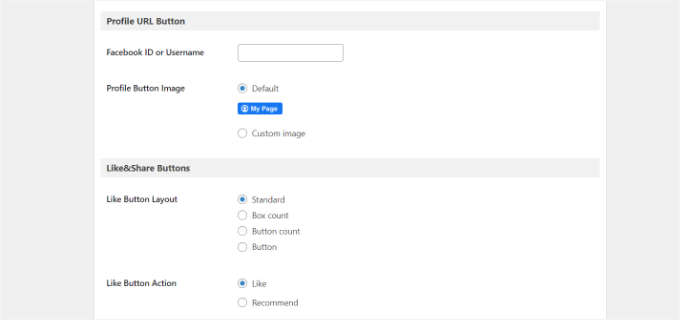
Wenn Sie die Profil-URL-Schaltfläche aktiviert haben, können Sie nach unten zum Abschnitt “Profil-URL-Schaltfläche” scrollen und Ihren Facebook-Benutzernamen oder Ihre ID eingeben.
Wenn Sie fertig sind, vergessen Sie nicht, Ihre Änderungen zu speichern.
Das Plugin fügt Ihrer WordPress-Website automatisch einen Facebook Like Button hinzu und positioniert ihn entsprechend Ihren Einstellungen.
Sie können auch den Shortcode [fb_button] verwenden, um den Facebook Like Button irgendwo auf Ihrer Website hinzuzufügen.
Das war’s schon! Sie können jetzt Ihre Website besuchen und die Gefällt mir-Schaltfläche auf jedem Beitrag sehen.
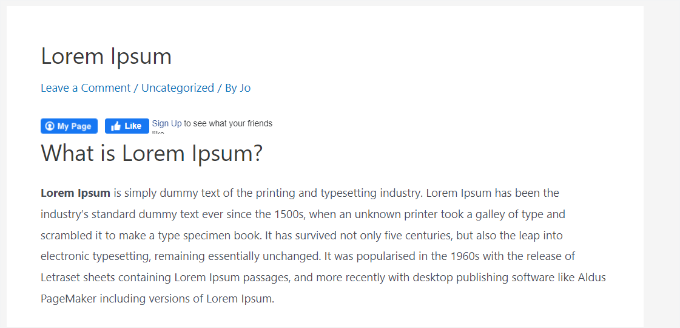
Methode 2: Manuelles Hinzufügen eines Facebook Like Buttons in WordPress
Eine andere Möglichkeit, einen Facebook Like Button hinzuzufügen, besteht darin, individuellen Code zu verwenden. Diese Methode erfordert jedoch das Hinzufügen von Code direkt in WordPress, daher empfehlen wir sie nur für diejenigen, die mit der Codebearbeitung vertraut sind.
In diesem Abschnitt werden wir das Plugin WPCode verwenden, mit dem jeder auf einfache Weise Code zu seinem WordPress-Blog hinzufügen kann.
Aber zuerst müssen Sie die Seite “Like Button” auf der Website Meta für Entwickler besuchen und zum Abschnitt “Like Button Configurator” hinunterblättern.
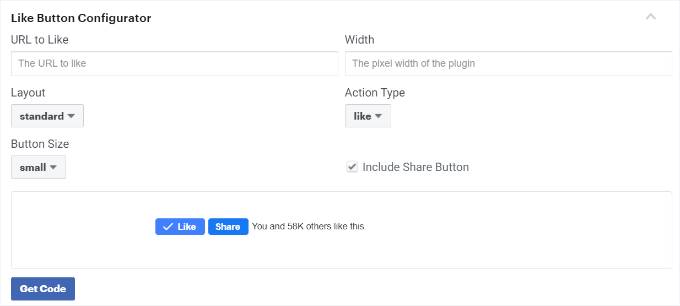
Geben Sie als Nächstes die URL Ihrer Facebook Seite in das Feld “URL zum Like” ein. Dadurch wird der Facebook Like Button mit Ihrer Seite verbunden.
Danach können Sie in der Konfiguration einfach das Layout und die Größe des Like Buttons auswählen. Sie erhalten auch eine Vorschau des Like Buttons.
Wenn Sie mit der Vorschau zufrieden sind, klicken Sie auf den Button “Code holen”. Daraufhin öffnet sich ein Pop-up-Fenster, das unter dem Tab “JavaScript SDK” zwei Codeschnipsel anzeigt.
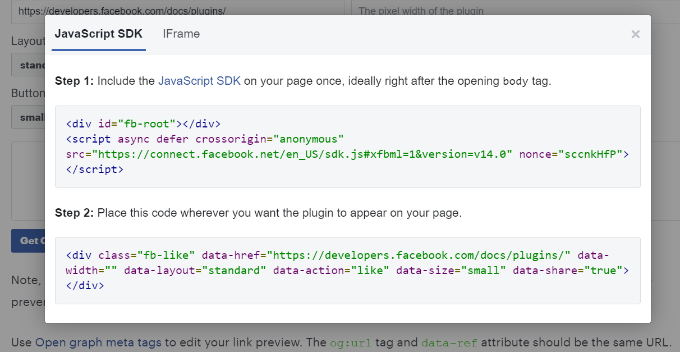
Bitte beachten Sie, dass das direkte Hinzufügen dieser Codeschnipsel zu Ihrem WordPress Theme Ihre Website beschädigen kann. Außerdem werden sie überschrieben, wenn Sie das Theme aktualisieren.
Deshalb empfehlen wir die Verwendung des WPCode Plugins. Mit diesem Plugin können Sie Codeschnipsel in Ihre Website einfügen und individuellen Code einfach verwalten, ohne Ihre Theme-Dateien zu bearbeiten. So vermeiden Sie das Risiko, dass Ihre WordPress Website beschädigt wird.
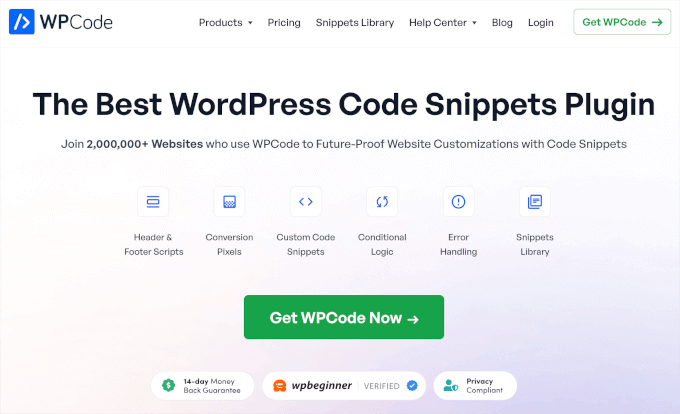
Außerdem haben wir WPCode auf unseren Websites vertraut, um individuelle Anpassungen reibungslos und effizient durchzuführen. Wenn Sie mehr über unsere Erfahrungen mit WPCode erfahren möchten, lesen Sie unsere vollständige Rezension zu WPCode.
Um loszulegen, müssen Sie das kostenlose Plugin WPCode installieren und aktivieren. Weitere Einzelheiten finden Sie in unserer Anleitung zur Installation eines WordPress Plugins.
Hinweis: Mit der kostenlosen Version von WPCode können Sie individuelle Codeschnipsel hinzufügen, die wir hier verwenden werden. Ein Upgrade auf WPCode Pro schaltet jedoch zusätzliche Funktionen frei, z. B. einen vollständigen Revisionsverlauf und die Möglichkeit, Ihren Code zu planen.
Nach der Aktivierung können Sie von Ihrem WordPress-Dashboard aus zu Code Snippets ” Header und Footer gehen.
Kopieren Sie dann den ersten Codeschnipsel und fügen Sie ihn in die Datei header.php Ihres WordPress Themes ein, direkt nach dem <body>-Tag. Kopieren Sie einfach den Code und geben Sie ihn in den Abschnitt “Body” ein.
Vergessen Sie nicht, nach Abschluss dieses Vorgangs auf den Button “Änderungen speichern” zu klicken.
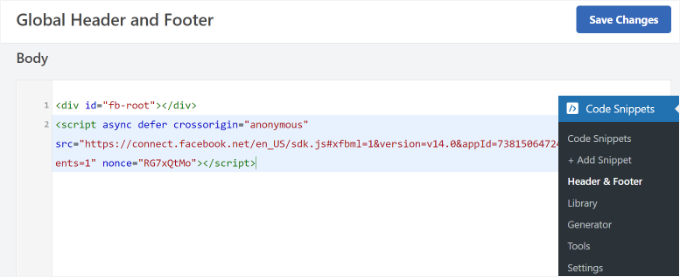
Als Nächstes müssen Sie den zweiten Teil des Codes kopieren und in Ihre WordPress Website einfügen, um den Facebook Like Button anzuzeigen.
Dazu können Sie in Ihrem WordPress Adminpanel zu Code Snippets ” + Snippet hinzufügen gehen. Oder klicken Sie einfach auf den Button “Neu hinzufügen” im WPCode-Dashboard.
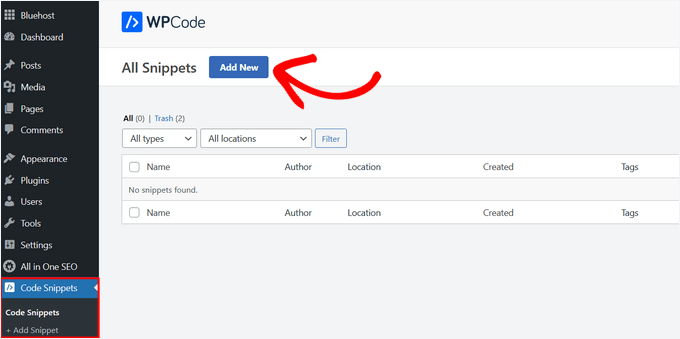
In der nächsten Ansicht können Sie mit WPCode ein Snippet aus der vordefinierten Bibliothek auswählen oder einen neuen individuellen Code hinzufügen.
Wählen Sie die Option “Fügen Sie Ihren individuellen Code hinzu (neues Snippet)” und klicken Sie auf den Button “Snippet verwenden”.
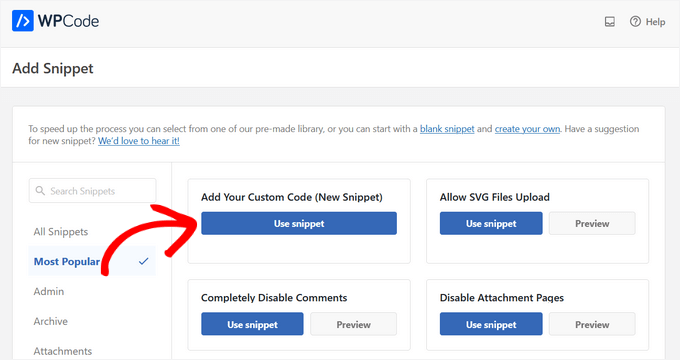
Danach können Sie Ihrem individuellen Code einen Namen geben und den zweiten Codeschnipsel unter dem Abschnitt “Codevorschau” eingeben.
Klicken Sie auf das Dropdown-Menü “Codetyp” und wählen Sie “HTML Snippet” als Codetyp.
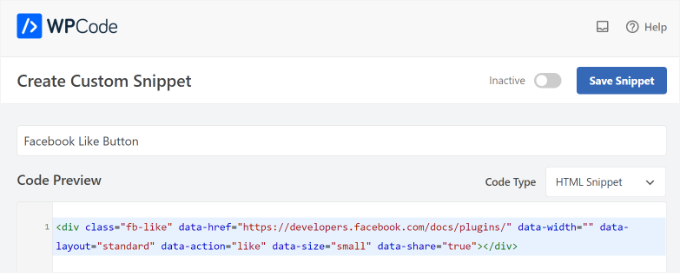
Anschließend können Sie zum Abschnitt “Einfügen” scrollen und auswählen, wo der Facebook Like Button erscheinen soll.
Nehmen wir zum Beispiel an, Sie möchten, dass sie vor dem Inhalt erscheint.
Klicken Sie einfach auf das Dropdown-Menü “Position” und wählen Sie die Option “Vor dem Inhalt einfügen” unter “Seite, Beitrag, Individuelle Inhaltstypen”.
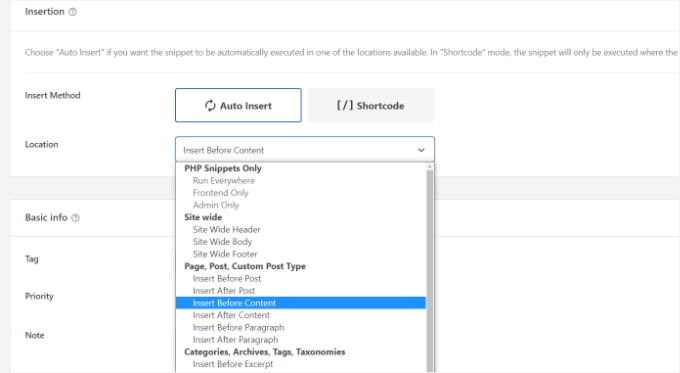
Sobald Sie fertig sind, können Sie auf den Button “Snippet speichern” klicken.
Sie müssen auch auf den Kippschalter klicken und ihn von “Inaktiv” auf “Aktiv” umschalten.
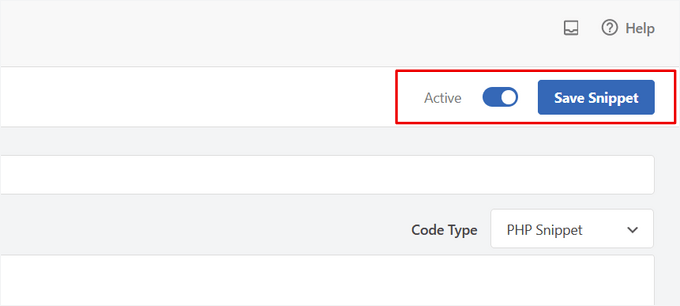
Das war’s. Ein Facebook Like Button erscheint auf Ihrer Website, nachdem Sie den Code eingegeben haben.
Bonus-Tipp: Was sind Open Graph Metadaten und wie fügt man sie zu WordPress hinzu?
Bei Open Graph handelt es sich um Metadaten, mit deren Hilfe Facebook Informationen über eine Seite oder einen Beitrag auf Ihrer WordPress-Website sammeln kann. Diese Daten umfassen ein Miniaturbild, den Titel des Beitrags/der Seite, die Beschreibung und den Autor.
Facebook ist recht intelligent, wenn es darum geht, die Titel- und Beschreibungsfelder abzurufen. Wenn Ihr Beitrag jedoch mehr als ein Bild enthält, kann es vorkommen, dass beim Teilen ein falsches Vorschaubild angezeigt wird.
Wenn Sie bereits das All in One SEO (AIOSEO) Plugin verwenden, kann dies leicht behoben werden.
Wir von WPBeginner verwenden das AIOSEO Plugin für die Verwaltung von OpenGraph-Einstellungen für Facebook und X, neben anderen SEO-Maßnahmen. Wir sind ein großer Fan davon, und Sie können unsere ausführliche AIOSEO Rezension für weitere Details sehen.
Gehen Sie dazu zunächst zu All in One SEO ” Social Networks und wechseln Sie zum Tab Facebook.
Klicken Sie anschließend auf den Button “Bild hochladen oder auswählen”, um ein “Standard-Facebook-Bild für Beiträge” festzulegen, wenn Ihr Beitrag kein Open-Graph-Bild enthält.
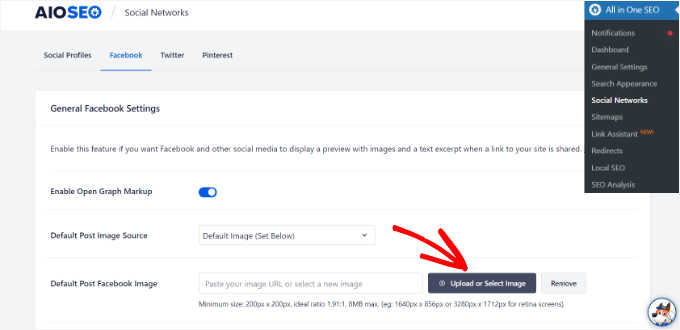
Darüber hinaus können Sie auch ein Open-Graph-Bild für jeden einzelnen Beitrag oder jede Seite konfigurieren.
Wenn Sie einen Beitrag bearbeiten, scrollen Sie einfach nach unten zum Abschnitt AIOSEO-Einstellungen im Content Editor. Dann können Sie zum Tab “Social” wechseln und eine Vorschau Ihres Vorschaubildes sehen.
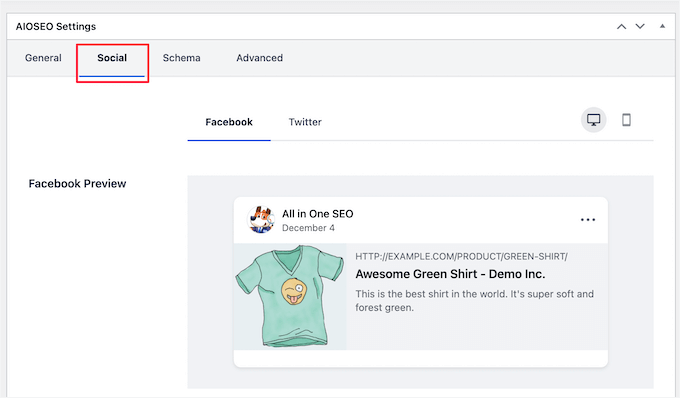
Scrollen Sie nun nach unten zur Option “Bildquelle”. Wählen Sie dann ein Open-Graph-Bild für Ihren Beitrag aus.
Sie können zum Beispiel “Angehängtes Bild”, “Erstes Bild im Inhalt” oder “Individuelles Bild” als Vorschaubild für ein geöffnetes Diagramm auswählen.
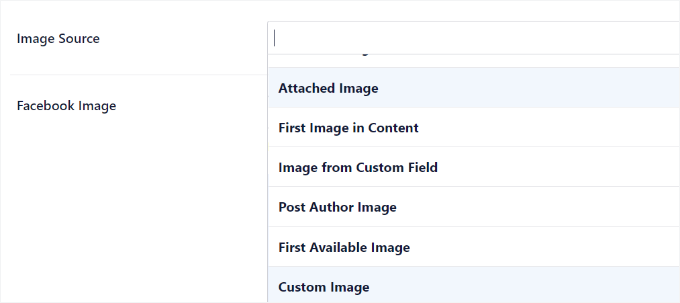
Weitere Details und alternative Möglichkeiten zum Hinzufügen von Open Graph-Metadaten finden Sie in unserer Anleitung zum Hinzufügen von Facebook Open Graph-Metadaten in WordPress.
Wir hoffen, dass dieser Artikel Ihnen geholfen hat zu lernen, wie man einen Facebook Like Button in WordPress einfügt. Vielleicht interessieren Sie sich auch für unseren Leitfaden zur Anzeige von Bewertungen auf Facebook Seiten in WordPress oder für unsere Expertenauswahl der besten Social Media Plugins für WordPress.
Wenn Ihnen dieser Artikel gefallen hat, dann abonnieren Sie bitte unseren YouTube-Kanal für WordPress-Videotutorials. Sie können uns auch auf Twitter und Facebook finden.





wpbeginner
@artist74 There is no EXACT point because it varies. The exact point is determined by where you want the code to show (for example before post / after the post / within the post etc). Once you decide that then you can also do further styling via CSS!
lo0_ro
and here are the codes for other services like identi.ca google plus one twitter etc
http://www.lo0.ro/2011/add-wordpress-social-buttons-from-code-identi-ca-facebook-like-twitter-and-google-plus-one/
dekanfari
Can I align it to left?
Ovidiu
any words of advice about the XFBML version? I copied the code straight from the facebook developer page, need to know if there is anything to do?
Editorial Staff
You need to add the Open Graph Meta Data to the site. We have edited the article. Look for the NOTE.
Admin
tyasmedika
Nice post…
How to add facebook like button in wordpress.com?
Thanks.
Please, Visit my blog. ^_^
Editorial Staff
You can’t… Switch to Self-Hosted WordPress.
Admin
Dror
Hi,
Is there a way to add the like button to the comments on a wordpress blog?
Thanks
Editorial Staff
Yes, you can have the like button on each comment by retreiving the comment permalink rather than the post permalink.
Admin
Redefining
I have a wordpress.com. I have no idea where to start with adding the Facebook Like button. I have been trying to find the single.pnp option. I just need a start on where to find it as I tried the Appearance and then go to theme and then what?Please can you advise?
Editorial Staff
This doesn’t work with WordPress.com sites.
Admin
Ruby
Thanks a lot I was just looking for that………
Aaron Grey
I’m torn between adding the facebook like button at the top of my posts or near the bottom, so I added it in both places. Does anyone know if this can cause issues to have 2 like buttons on one post?
Editorial Staff
It shouldn’t cause issues… both won’t update simultaneously, but it will display the same count on each page refresh.
Admin
Aaron Grey
I kind of thought so. I just never heard anyone mention doing this in any tutorials. Thanks for the info.
Dimitris
Hi, I placed the code in the single.php file and inside the loop as you have instructed. When I Like the post everything works correctly except from the title of the post on FB’s wall.
For example on MyWebiste.com I like the post with a title MyPost.
On FB wall shows that someone “likes MyWebiste on MyWebiste.com”, not “MyPost on MyWebiste.com”
However, the link of “MyWebsite” links correctly to the respective article, “MyPost”.
For me that means that the code works just fine and retrieves the right article, but not the title of the article and I’m trying to figure out if I need to do something else in order to show the title of the posts on FB wall and not only their right links.
Any suggestions would be appreciated.
Thank you.
Editorial Staff
That’s weird because it should take your page title. But to override an fix this issue, look at the resource link that we have in this article. You will need to add og:title meta tag.
Admin
Alvin
Hello..
I’m a site owner and I want to know who’s clicked the like button on each post. Not just the number of people. Is that possible?
Editorial Staff
Yes, you can showfaces=true and it will show the face of some people.
Admin
Aaron Torng
Thanks for the guide! I successfully added the ‘like’ button to my individual pages but I’m still having problems adding it to my main site which aggregates all the posts. Do you know which page I’m supposed to add it to and where?
Thanks again,
Aaron
Editorial Staff
Use the Like Box instead of the Like Button on the main page, and put it in your sidebar.
Admin
Sipovics
Hy!
My problem is that if I “Like” a post on my site (which is named kukkold.hu) the facebook shows on my profile page that I like the kukkold.hu link on the site kukkold.hu. I experience this at every post, so I always like the main page of my site instead of the link and name of the post. What can be the problem? I tried varius like plugins, and I have inserted the code directly into the loop, but the problem is always the same and it’s really annoying. For a test I wrote a specific permalink into the space of the ID)); ?> block, but the problem was the same again.
The like counter goes well, so it knows which post how many times was liked.
What should I do? Please help me!
Thank you!
Editorial Staff
You need to paste the codes mentioned in this post INSIDE THE LOOP. If you post it outside the post loop, then it will not work.
Admin
charle
im using wordpress.com and i trying to add the facebook like box in my blog but i doesn’t work. i read some forum that saying wordpress.com cant read iframe code. is that true? any solution?
Editorial Staff
Yes thats true. You are very limited with WordPress.com site. The solution is move to a self-hosted setup. Utilize our Free Setup service.
Admin
Joe
I added the code in the loop as you sayed…but nothing happens!! I tried more and more times, in different parts of the loop…. it just doesn’t work!! Any suggestion? Thanks
Editorial Staff
This is an iframe code, so it should work because we are using it on our site.
Admin
drowan
This is great, however I am encountering a glitch. The code functions fine and everything, but when I like it, instead of ‘liking’ the specific post, it instead ‘likes’ the parent home page. The same shows up on the Facebook feed, just the home page. Have you encountered this problem, and what can I do to fix?
Thanks!
drowan
my permalink structure at this time is /%category%/%postname%/ for reference. All the ‘likes’ I’ve tested only link to the parent site.
Editorial Staff
If you put the code inside the loop, then it should not do that.
Admin
Editorial Staff
The code that we have is the same one running on this site. As long as you post it in the loop, it should like the page that you are on.
Admin
wilson keenan
Thanks so much for this.
I was wondering – are you using this iframe (in the single.php) w/ meta tags in header.php?
I’m wondering if the URL in the facebook meta tags is conflicting with my ability to use the edited like button you have here?
Thanks so much,
Wil
Editorial Staff
We are not using Meta tags in the header at the moment, so it is just an iframe.
Admin
Aurora
Thanks for this great resource! I had played around with some plugins but they just weren’t working well for me, then I found your tutorial and just edited the code and VOILA! Success!
Thanks!
Andreas Koutsoukos
Hi, i have question about that facebook button layout.
My friend wants me to code blog and he send me this photo and ask if i can custom the like button like that http://www.andreaskoutsoukos.com/images/others/facebook_like.jpg.
Is it possible and how?
If some one know about that.
Editorial Staff
Don’t think that there is a Facebook API that lets you like the layout…
Admin
Ash Robbins
Great post guys, so simple to add in and configure. Nice work.
sanjaperic
Hi!
Thanks for this code, but something not working well…
For example, if I go on post, I see “Like button and Be the first…message” Ok. Fine! No one like ’till now, doesn’t matter, I will be the first.. so click, Like! And then! Wow! I see that 178 people acctualy like this, but I couldn’t see that untill I like it first. Do you understand? My english is not so good, but hope you can understand what I am talking about…
If you find a time to go on my page, and then on any single post, you will see Like button and message Be the first… but if you like it, than you’ll find out, that you weren’t the first!
Editorial Staff
It is a very weird problem. Normally it won’t show you pictures unless your friends like it, but it certainly shows the count.
Admin
Huw Rowlands
Hi,
I have the like button appearing, but when clicking nothing at all happens??
Please can you advise on this…
I even installed the Facebook ‘Like’ plugin and had exact same issue.
Thanks
Editorial Staff
Don’t know what could be the issue. We have the exact same code running on our site… and it is working fine.
Admin
Paul
Working perfectly now. Must have been a problem from Facebook’s end.
Rakibul Islam
This seems to not working on my site. It showing error after clicking the Like button.
What can i do now?
Editorial Staff
We are using this code on our site, so don’t know what could be causing the error. Can you please specify what error it is.
Admin
Janice
Thanks for the tutorial and great tips inside the comments. Just installed on Atahualpa theme. Great!
Sean Serritella
All I know is that I tried putting in code for the like button and now I get double posts.
Eli
Same happens to me, had to erase it because it doubled the text of my posts
Eli
Ok! Forget it! Since IE jumps every time I paste something, I must have doubled “the-content” part somehow.
Replaced the old single.php, pasted again your code (both before and after “the-content” and works great either way!
A million thanks for the code!
agon
thank you very much, i am starting to learn wordpress…and here i found your site very helpfull for begginers…keep it up…
Sean Serritella
Dude, what loop? What is a loop? I don’t get what that means. I tried pasting the code in the single php page but got nothing.
Editorial Staff
Loop is the code which says if is post…http://codex.wordpress.org/The_Loop
Admin
Jason Fonceca
Fantastic! I know this may seem like a useless comment, but I really am thrilled to find this tutorial. Much appreciation.
Lindsay
Is there a way to show on the sidebar which posts have the most likes on Facebook. I think it would be neat to see which ones are shared most often.
Mark
I posted it in my style.php so I am not sure if that is what you mean by putting it in my loop?
Mark
sorry single.php file is rhe one I changed
Mark
I addedd the button to my code and it appears in my blog posts. however when I poke it, my facebook profile does not reflect that I like it? Am I doing something wrong? I should see that I like it my feed, am I correct?
Editorial Staff
Yes you should see that you like it in your feed. Are you pasting the code inside your loop?
Admin
Jose
Thanks for sharing. How did you make your retweet and facebook share buttons to remain permanent on your blog?
Editorial Staff
We are using a plugin called Smart Sharing. Do a search on our site and you should be able to find it. It is exclusive for WPBeginner users.
Admin
Janek
thanks for the good tutorial Facebook Like Button in WordPress
helped me very much!
Que
I have added the code on single.php , but the button doesn’t appear on all my post.
If I add the code on every post (from HTML tab), the button appear but encountered problem.
Why this happen? Is it depend on the theme?
Editorial Staff
It will appear on all single post pages. If you mean that you want to show it on all pages in your category pages or your index pages, then you would need to paste the code in your index.php inside the post loop.
Admin
Que
No, I mean doesn’t show in my posts not pages. Or maybe I placed in wrong part of single.php. Is it possible to paste the code in any part of single.php?
Thanks.
Andrea
This is probably a stupid question, but are the instructions you gave relative to the small “thumbs-up” graphic and text (showing 184 people liked this. Be the first of your friends) at the top of this post? Or are they for the larger square graphic appearing to the left of your post (the one appearing underneath your tweetmeme button that says 45 shares).
I’d like to just have that larger square graphic on my blog and have it appear next to my tweetmeme button and I’m wondering how to go about that? Is there a tutorial you can direct me to?
Thank you so much for any guidance!
Editorial Staff
This tutorial is about the like button. Just use the search button on this site and look for Facebook Share button and you will find the tutorial for that.
Admin
Andrea
Thank you – I did as you suggested and found that tutorial and left you a comment on it as I was unsuccessful in getting it to work.
dillon
The like button is the best little added feature to a site thanks for the lesson.
Sara
Works great! I narrowed the height to get rid of some white space it caused, but that was the only tweak.
Jan Weiss
I added the code however if you go to the individual post it gets apage that only shows the facebook “like” button and does not take the viewer to the actual post. So now if a viewer goes to the post they lose it. Any suggestions?
Editorial Staff
Have no idea what you are talking about. Please use our contact form and show us what you are talking about by linking to your site.
Admin
Ciociaria
Hi to everyone,
I see more blogs use only the button and the number of persons who like without the phrase “be the first….”
how is it possible?
thanks
Editorial Staff
You need to change the layout parameter to button_count as mentioned int he article.
Admin
Titanas
Hey,
What about adding the site’s URL after the post title? Something like this: X likes Y on Z.com
Editorial Staff
You don’t get to control that. It is facebook who is doing that, and they only display page title.
Admin
PelFusion
just placed one on my blog
Danang Sukma
Finaly iam found plugin like the float stuff in your site. Thanks for your share.
Mike
I have noticed many sites have added the button to the top of the page. But isn’t it a better idea to place the button at the bottom of the page, allowing readers to click without scrolling up after they have finished reading the article ?
Editorial Staff
It is entirely up to the blogger. You can try it on your blog and see which placement works best for you
Admin
Tiffany
Is there a way to make it display at the bottom of the post instead of the top?
Editorial Staff
Yes just add it after the_content php part of your post … At the bottom of the loop. It can be added anywhere in the loop .. doesn’t have to be at the top.
Admin
Heather
Unfortunately, I don’t have a single.php file in my Atahualpa theme. I’m not sure where else I could put the code. Any ideas?
Editorial Staff
Don’t know a lot about Atahualpa theme very much. Please ask in their support forum, or you contact us via email and we can take a closer look at your site.
Admin
Stu
Re: Atahaulpa – I had the same issue as Heather. Solution: In Dashboard, go to Appearance – Atahaulpa Theme Options – Style and edit center column. Paste it in “The LOOP” section. Works like a treat!
Stu
Been noticing this Facebook like button appearing on more and more sites lately and think it’s a great idea. Time to see if I can implement this now… WITHOUT completely destroying my blog (you’d be surprised how close I’ve come multiple times once I start messing with the code – programmer FAIL).
Bottomless
Here’s the WordPress plugin:
http://wordpress.org/extend/plugins/like
No coding necessary, you can customize the look and placement of the button in the settings interface.
Amanda
Love the article but I have encountered some problems. I don’t know where to find the single.php file? lol. Could you guide me? I use wordpress.com and I’m not sure if that makes a difference.
Thanks!
Editorial Staff
This is for Self Hosted WordPress blogs not WordPress.com themes.
Admin
jeh
Just what I was looking for. Thanks
hydir
Thanks for this tutorial.
I really looking how to implement it and found the answer here.
Great!